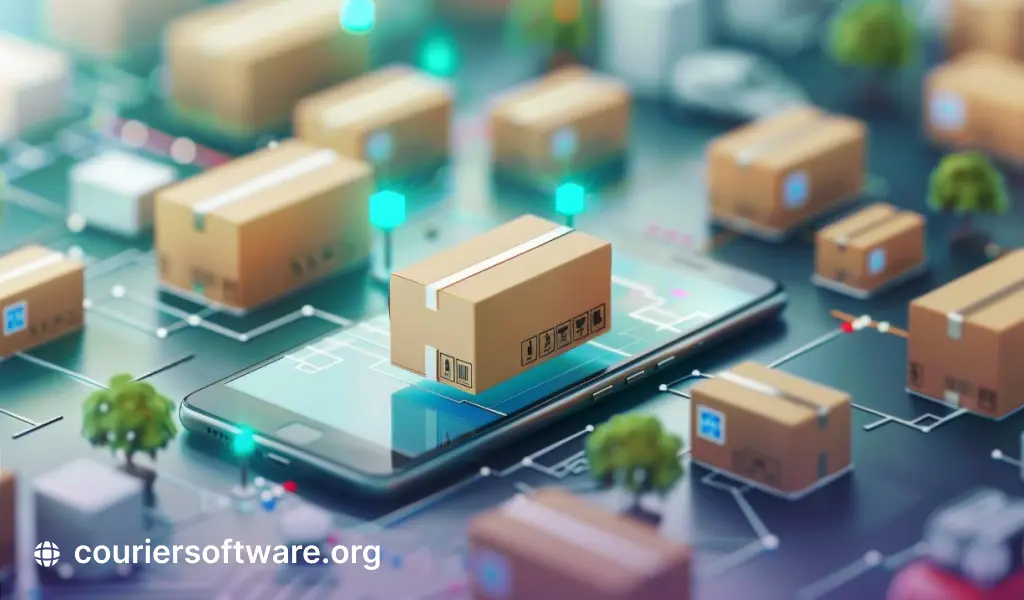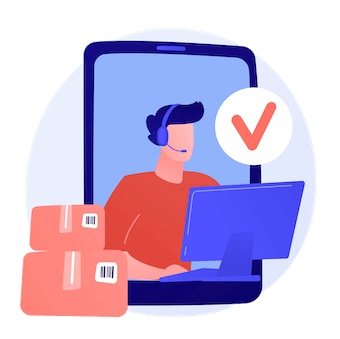Implementing cloud-based courier software is a project that requires close cooperation with creators experienced in creating various types of digital products, starting with mobile applications and websites on web browsers, ending with cloud-based courier applications. The key goal of this cooperation is to choose a solution that will perfectly meet our courier business needs. Therefore, choosing a partner with the right experience and skills is a key decision.
What benefits does cloud-based courier software offer?
Cloud solutions provide universal, convenient, and fast access to shared IT resources (including access to various networks, databases, courier applications, and services), requiring only a minimal level of management or interaction with the supplier.
Thanks to them, we create an astonishing work environment that has 4 basic advantages: security, efficiency, full integration of courier business applications, and the possibility of advanced data analytics. Implementing cloud-based courier software is also a source of savings and allows the courier company and its management to focus primarily on key operational activities.
1. Less customization and management
Managing a courier business in the cloud-based courier software saves you money and time, both in building software and in managing and maintaining it. Using cloud-based courier services, you write less code, which means there’s less code to maintain. The unique functionality that requires writing code and sets you apart from your competitors in a cloud-based approach is also performed on dedicated, unmanaged cloud systems. Sure, there are still cables, servers, and security updates behind the scenes, but the cloud provider makes sure we don’t have to worry about that.
2. Extremely scalable
With cloud-based courier software, you can handle 10 users as easily as many users. The capacity that cloud-based courier services and systems can offer is virtually infinite and can be quickly and automatically adjusted to demand. With cloud-based courier software, you pay for what you use, and the costs change with you. This makes cloud-based courier applications ideal for platforms with fluctuating loads.
3. Quick set-up
Because cloud-based courier software development leverages existing “Lego blocks” as best as possible, complex functionality can be quickly added to applications and concepts that were previously only available to courier businesses with a lot of patience and deep pockets. This shorter build period is beneficial not only for cost reasons but also for time-to-market. A good example is the cloud-based courier software that Courier Software has recently implemented for customers.
4. Mobility
All we need to do is run the appropriate cloud component on such a device, and we can make modern cloud-based courier applications available – either traditional ones, executed in the cloud data center, or applications wrapped in their own, virtualized execution environment.
There are many technical, courier management solutions, but the effect is the same: the user has effective, secure, and efficient access to their data, programs, applications, and services on any device at any time. And even if they lose their device, it is not a problem, because the data is in the cloud
5. Uninterrupted operations
Cloud-based courier software, in which all resources are virtualized, means detachment from a physical server. In such a situation, a failure of a single server is not a problem, because the virtual machine running on it can be recreated on another server.
6. A cheaper solution
It is clear that the SaaS model requires significantly larger financial outlays in the initial implementation phase, primarily through outsourcing the entire infrastructure. However, if we take into account the long-term perspective, the matter is no longer so obvious. Although some models consider SaaS services to be unprofitable from a five-year perspective, the vast majority of analysts recommend SaaS for most long-term courier business scenarios.
The subscription model offers additional financial benefits over the traditional “pay and pray” licensing model. First, the predictable fee schedule simplifies the planning and budgeting process. Next up are the implementation costs. The pain of running over budget is a common problem with traditional on-premises implementations.
Removing expenses related to proprietary devices and software from the IT model significantly simplifies implementations. In the SaaS model, the target environment is already fully functional, and there is no need for installation, or configuration of solutions.
7. Security
In fact, leading SaaS providers can provide a level of protection that exceeds the standards most enterprise IT teams can access. In addition, providers guarantee continuous access to the system anywhere, anytime, in accordance with service level agreements (SLAs) that include financial penalties in the event of service interruptions.
Outsourcing courier systems also frees up internal staff resources for other tasks. Employees will no longer have to spend time dealing with failures and restoring lost data. Most delivery SaaS service providers offer the ability to create data backups and use security that goes beyond possible failure scenarios outside their own sector.
This means not only a reduced risk of problems, but also that if they do occur, appropriate systems will minimize the damage. Service providers do not make empty promises and base their guarantees not only on technical solutions, but also on the work of experts in the fields of system optimization, data security and maintaining courier business continuity.
Challenges when using cloud-based courier software
Although extremely practical, safe, and easy to use, cloud-based solutions are not without challenges, and some companies simply cannot or should not use them. In the context of threats, it is crucial to identify them at the pre-implementation stage and protect against them. The courier company must identify and consider the disadvantages or other limitations before taking any action. This requires asking yourself a few fundamental questions in the following areas:
- Regulatory restrictions related to the protection of personal data.
- Automatic upgrades: if we place all processing in the cloud (SaaS), we will have no influence on the upgrades being performed, which means we may be surprised by the introduced changes in functionality.
- Internet dependency: which poses a major risk to courier businesses in the event of a network failure.
- Employee responsibility – they should use the power of the cloud in a conscious manner so as not to generate unnecessary costs resulting from the increased consumption of computing power for analyses whose execution is not critical.
- Limitations resulting from customer contracts: sometimes the terms of cooperation with certain contractors prevent the use of cloud solutions.
However, in most cases, moving to Courier Software’s cloud-based service brings astonishing benefits. This is especially true for courier companies that intend to implement new solutions and do not yet have the necessary infrastructure.
Another example is courier companies, whose business is highly seasonal, as well as those whose operating model assumes outsourcing of processes that are not the core of the business. The Courier Software’s cloud-based solution is a powerful solution for startups and all other courier companies that plan to significantly expand their operations in the short term.
Transforming business processes with cloud-based courier software
Courier business processes are the foundation of every enterprise, and personalized cloud-based courier software has the power to significantly transform the courier industry. But how do they look in practice and why may ready-made solutions not meet the requirements of modern courier business? A key aspect in choosing any support systems is to adapt the courier software to the specific requirements and characteristics of a courier industry.
When deciding to create custom cloud-based courier software, we should determine the courier company’s needs before starting work, on which the software developers should focus when building the courier management solution.
The analysis of needs will then allow us to make a quote, determine the scope of the service and choose the aspects that the proposed offer includes. It is worth remembering that there are various models of cooperation with an external company, such as time and materials, thanks to which the client pays only for the time, materials and technologies actually used.
Implementing cloud-based courier software is a process that requires careful cooperation with the developers. After preparing the offer and assigning the project work, it is fundamental to maintain clear and active communication. Depending on the needs, the frequency of monitoring progress and asking questions can be adjusted.
Through mutual understanding of courier business needs and analysis of processes, it is possible to deliver an astonishing solution that will actually bring benefits. It is also phenomenal practice during the implementation of the project to use tools for monitoring progress. They allow for regular version checks, corrections, and reporting.
Why should you choose Courier Software’s cloud-based?
Companies specializing in customizing courier software to specific needs are able to provide support at every stage of the process, from requirements analysis to final implementation. It is worth checking the previous implementations and the practices they use. This applies to both technical aspects and communication processes in the project team, as well as focusing on the quality of the code and programming processes.
There is a certain amount of risk involved in implementing custom software, so it is essential to avoid shortcuts and ensure a solid technical foundation. Making changes and adapting to potential issues is another aspect of applying best practices. A proactive approach to detecting and resolving potential difficulties contributes to flexible adaptation to changing courier business conditions.
Conclusion
In today’s article, we explored the benefits of cloud-based courier software, which is a key success factor for the modern courier industry. Starting from the value of investing in personalized solutions, through the transformation of courier business processes, to modern trends in this field, we analyzed the key aspects that affect the effectiveness and awesomeness of courier companies.
Cloud-based courier software is not only becoming a key element of courier business strategies, but is also revolutionizing the way courier companies deliver value to their customers. Investing in this breath-taking technology, working with developers, understanding courier business needs, applying best practices, and adapting to modern trends allow courier companies to succeed in a dynamic business environment.






